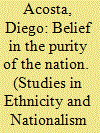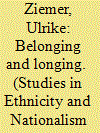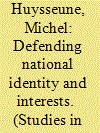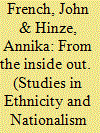|
|
|
Sort Order |
|
|
|
Items / Page
|
|
|
|
|
|
|
| Srl | Item |
| 1 |
ID:
101981


|
|
|
|
|
| Publication |
2010.
|
| Summary/Abstract |
Immigration is one of the most important issues in the European Union (EU). In order to address the subject, the EU adopted a Directive on a long-term residence status for third-country nationals (TCNs). While implementing this Directive, many Member States changed their migration laws, thus increasingly linking the acquirement of this status with integration requirements. The integration requirements emphasise language acquisition and knowledge of the country, including its history, culture, and constitution. Why is this trend taking place at this particular point in time? While many factors could be mentioned, these integration tests are also the consequence of the constant repetition in the belief of the purity of the nation in certain political discourses, particularly by the populist radical right. This line of thinking creates a worrying problem for the future as European national identities are seen as immutable, thus complicating the acceptance of the new Europeans with an immigrant background. Hence a question arises: To what extent can we see a correlation in some EU countries between the recent introduction of harsher integration requirements for obtaining permanent residence and a certain discourse on national identity, primarily put forward by radical right parties?
|
|
|
|
|
|
|
|
|
|
|
|
|
|
|
|
| 2 |
ID:
101987


|
|
|
|
|
| Publication |
2010.
|
| Summary/Abstract |
This paper examines the question of long-distance nationalism and Armenian youth in contemporary Russia. It contributes to existing debates on diasporic cultural identities and shows that long-distance nationalism is not simply an elite-driven phenomenon, but involves complex cultural, political, and symbolic processes and practices. Drawing on data obtained during six months of ethnographic fieldwork amongst Armenian youth in the city of Krasnodar, Southern Russia, it will be shown that young Armenians exhibit aspects of diasporic long-distance nationalism in different ways. While young Armenian men hold on to cultural traditions and practices that are formed in the past, female research participants have started to challenge them.
|
|
|
|
|
|
|
|
|
|
|
|
|
|
|
|
| 3 |
ID:
101980


|
|
|
|
|
| Publication |
2010.
|
| Summary/Abstract |
As a movement defending the interests of the wealthier northern regions of Italy, the Lega Nord proposes a nation-building discourse emphasising the successful insertion of Padania (i.e. northern Italy) in the global economy. While its rhetoric exalts the virtues of a liberal economic model, in recent years, the party has also defended the exclusive right of Padania to economic protection. This economic protectionism finds a parallel in the party's defense of cultural identity, although this identity equally expresses the capacity of Padanians to participate in the global economy. This defence intends to assign Padanians a privileged position in their territory and hence proposes discriminatory practices towards outsiders, especially immigrants. The party thus solves the tension between its legitimisation of and resistance against globalisation by proposing an asymmetric model of globalisation that envisions an internal and international political order based on unequal rights and obligations - and thus privileges for Padania.
|
|
|
|
|
|
|
|
|
|
|
|
|
|
|
|
| 4 |
ID:
101975


|
|
|
|
|
| Publication |
2010.
|
| Summary/Abstract |
The article seeks to challenge the implicit equation made between national autonomy and personal freedom. Post-socialist Mongolian identity, articulated on a notion of resistance against Chinese territorial and biological encroachment, is accompanied by an explicit, often violent, anti-Chinese discourse. This resistance against an external enemy also has a centripetal effect on Mongolian society, and contemporary notions of Mongolianness tend to congeal into a homogenised identity that leaves little space for personal reinterpretations. For those whose voices are not heard, such as Mongolian women and gay men, 'freedom to be ethnic' can be far from liberating. The data I present in this article suggest that, while it is routinely depicted as the main danger against which to rally, China can, for some people, open up spaces of opportunity and liberty unattainable to them within Mongolia.
|
|
|
|
|
|
|
|
|
|
|
|
|
|
|
|
| 5 |
ID:
101983


|
|
|
|
|
| Publication |
2010.
|
| Summary/Abstract |
Since the fall of communism, democracy has come to be seen as the 'only game in town'- the only legitimate form of political system. Democracy is considered legitimate because it provides for individual rights and allows the people access to the resources of the state. If 'we the people' defines the limits of these entitlements, the next logical question is who are 'the people'? In contemporary developed states, the problem of diversity is most often framed as a problem of immigration; the arrival of new groups threatens both the presumed homogeneity of established nations and their democracy. We argue for a new conception of democracy, which takes into account the constructed nature of 'the people' that democracy empowers. This paper attempts to provide such an account by advocating a new understanding of the relationship between nationalism, citizenship, and democracy.
|
|
|
|
|
|
|
|
|
|
|
|
|
|
|
|
| 6 |
ID:
101978


|
|
|
|
|
| Publication |
2010.
|
| Summary/Abstract |
This article examines how the notion of multiculturalism is defined at the level of Finnish youth work. Local youth work is examined as a subpolitical arena in a rapidly changing and culturally diversifying society where answers by public institutions are not available. The essential objective of this article is to unravel the rationales of multicultural subpolitics and examine which policies these rationales enable. The data of the study consists of ethnographic observations of and interviews with youth workers in eastern Finland. The results of the study indicate that the subpolitics of multiculturalism are implemented through strategies of rationalisation and governance of minority populations rather than by recognising national and cultural ambivalences. The thesis is that such (sub)politics may reinforce the risk of cultural and ethnic demarcations among young people.
|
|
|
|
|
|
|
|
|
|
|
|
|
|
|
|
| 7 |
ID:
101973


|
|
|
|
|
| Publication |
2010.
|
| Summary/Abstract |
This paper excavates the entanglement of British nationalist identity politics with sport, terrorism, place re-imagining, mega-event bidding, and corporate neoliberalism. We focus on London's 2012 olympic bidding and the coalescence of corporate, state, civic, and sporting interests surrounding the national (re)imaginings that characterised the bid. We open with a critical reading of the bid narratives explicating how selective assertions of Britishness were envisioned through the motifs of harmonious multicultural unity, 'youth', and passion for sport. We focus on how these narratives offered up 'idealised' multicultural citizens and harmonious diversity as a reactionary form of nationalist 'pride politics' (Fortier 2005). We subsequently juxtapose these narratives with a critical reading of English press and political discourse in the aftermath of the 7 July 2005 bombings - the day after London was awarded the olympic games. This juxtaposition reveals the tensions and ambiguities between assertions of inclusive civic nationalism - that apparently transcends ethnic difference - and the geo-politics of the 'war on terror' within Britain's post-imperial self imaginings. Specifically, we tease out the place - and ambiguities - of the 2012 olympics within these imaginings reading the London games as an exemplar of a soft-core ideological spectacle informing selective nationalist narratives within the context of unfolding neoliberal politics.
|
|
|
|
|
|
|
|
|
|
|
|
|
|
|
|
| 8 |
ID:
101985


|
|
|
|
|
| Publication |
2010.
|
| Summary/Abstract |
This article responds to Brubaker's (2005) concerns about the '"diaspora" diaspora' effect on sociology of national identity and migration, and the related thought by Kaplan (2007) about a national community as something more tangible and close-knit than just 'imagined' by Anderson (1991). I refer to the ideas of the occupational 'platoon'- derived from Shils (1957) and Hearn (2006)- and platoon friendship as representing the occupation-friendship-nationalism conflation. Having conducted narrative-biographic interviews with twenty-five Russian academics now residing in the United Kingdom and the United States, I look at how they understand their new, diasporic spaces as impacted by their Soviet platoon friendship - a feature that could be used as a criterion for recognising a putative diaspora.
|
|
|
|
|
|
|
|
|
|
|
|
|
|
|
|
|
|
|
|
|